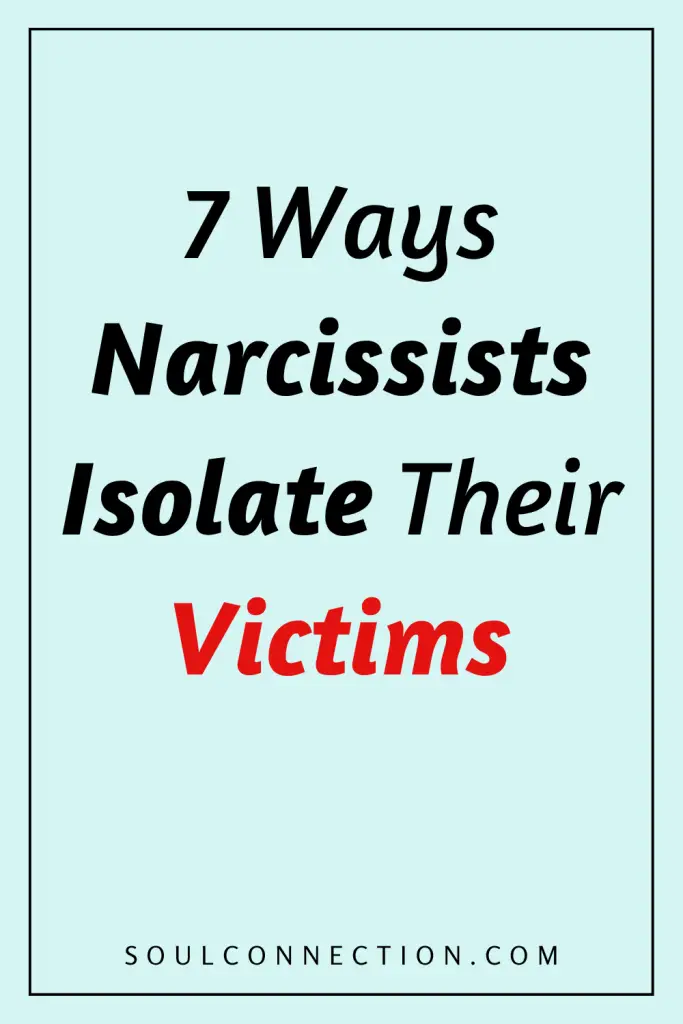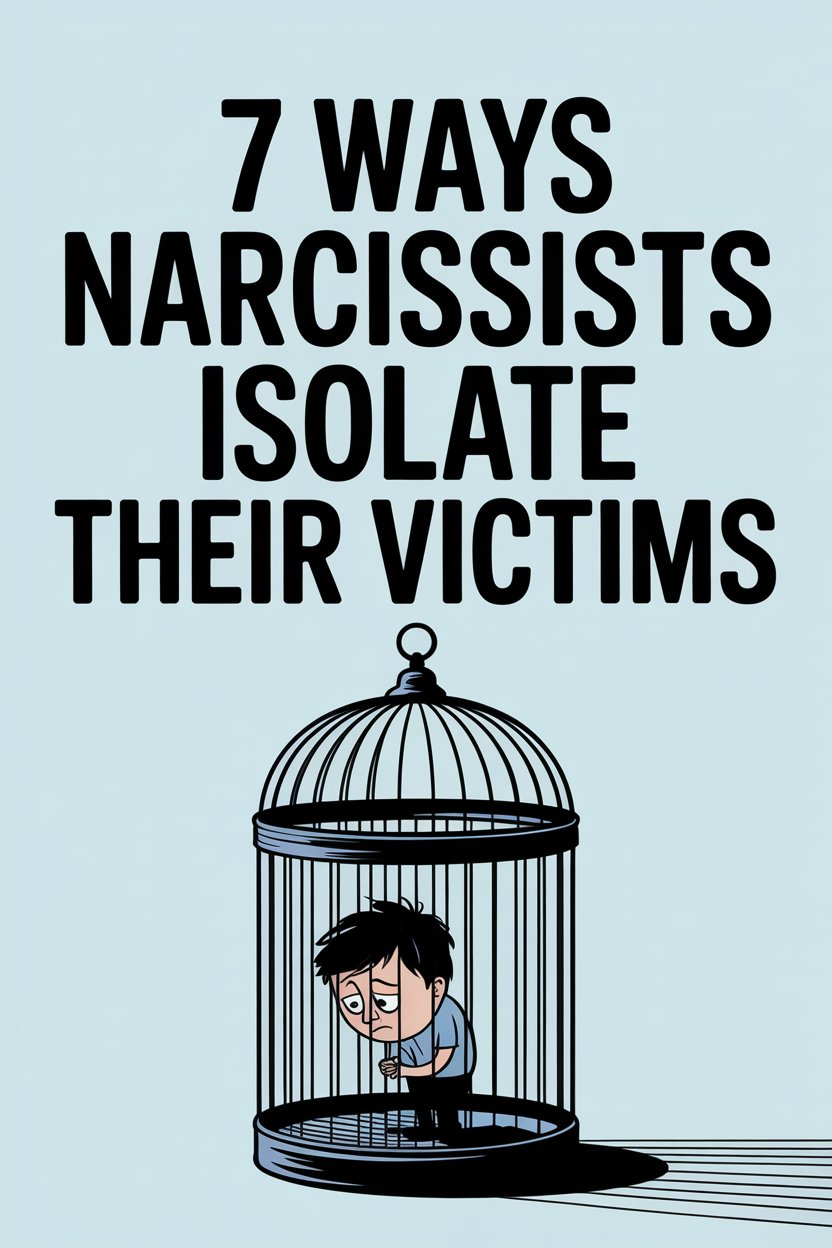There’s nothing quite like the dizzying dance of a narcissist pulling their partner into ever-tightening circles—until suddenly, the circle is just you and them, and you’re wondering where everyone else vanished to.
Isolation is one of the narcissist’s favorite party tricks, and—unfortunately—it’s a trick that works. Here’s how they manage to pull off this social disappearing act, one relationship at a time.
1. Turning Friends Into Enemies
Narcissists could teach masterclasses in sowing discord. When a narcissist senses your friends are a little too loyal, they’ll start planting seeds of doubt faster than a dodgy gardener with a sack of weeds.
Maybe they drop casual zingers (“Are you sure she really supports you?”), or they manufacture drama (“He doesn’t respect our relationship”). Suddenly, hangouts with pals become minefields, packed with anxiety and guilt.
Before you know it, you’re cancelling brunches and ghosting group chats—because who’s got the energy for friendships that now feel like emotional obstacle courses?
Friends fade, and the narcissist becomes the only one in your corner. A neat trick, if devastating.
2. Waging War on Family Connections
Family can be a fortress, but narcissists are siege experts. They’ll home in on that one annoying relative and use them as a wedge.
Maybe it’s passive-aggressive comments about your parents’ “interference” or relentless criticism about your sister’s influence. Or perhaps they just start making you feel subtly embarrassed about your background—because if your family isn’t “good enough” for the narcissist, why see them at all?
Family gatherings suddenly turn into events you dread, armed with excuses: “We’re too busy,” “They’re too judgmental.” Months pass, and the distance grows.
With your support network on mute, the narcissist’s voice becomes the loudest in the room.
3. Guilt-Tripping and Emotional Blackmail
Narcissists are Olympic-level guilt-trippers. Making plans with old friends? “Oh, so you’d rather see them than spend time with me?” Accepting a call from your mum? “Why do you always put your family first?”
Even the most innocuous coffee catch-up gets twisted into a sign of your betrayal, or a personal attack.
The result: you start self-monitoring, avoiding invitations or conversations that might provoke a guilt storm. Eventually, it feels easier to just stay home and keep the narcissist happy. And that’s exactly what they want.
4. Playing the Victim Card
If there’s an award for ‘Most Hard-Done-By,’ a narcissist already has it on the mantle. Nothing gets people rallying to their side like a good sob story.
If you do manage to keep ties with friends or family, the narcissist spins tales about how misunderstood, mistreated, or unsupported they are—by your people, of course.
Now you’re caught trying to “prove” your loyalty, defending them to those who care about you, or even apologizing for things you never did.
This endless cycle can wear down the most committed friend group, and—eventually—people stop reaching out. Not because they don’t care, but because they’re tired of being cast as villains in a drama they never auditioned for.
5. Undermining Your Self-Confidence
Isolation isn’t just about cutting you off from others; it’s about making you question your right to connect at all.
Narcissists are skilled at chipping away at your self-worth, one snide remark and backhanded compliment at a time. “You’re so awkward at parties,” or “Your friends only stick around because they pity you.”
This relentless erosion makes even the thought of socializing exhausting. Why bother, when you’re convinced you’re the least interesting person in the room?
Much easier to stay safely within the narcissist’s orbit, where at least you know the rules—however warped they are.
6. Creating a Crisis Out of Thin Air
It’s uncanny: the minute you make plans to see someone, the narcissist is suddenly in crisis. Stomach bug, existential breakdown, mysterious injury—take your pick.
Cancelling on friends becomes a regular occurrence, and eventually, invitations dry up. Who wants to be stood up for the fourth time running?
If you do push back, a full-blown melodrama erupts. Clearly, your priorities are out of whack if you’d abandon your partner “in their time of need.” (Their time of need apparently lasts 24/7.)
Soon, stepping outside the relationship feels like a betrayal.
7. Gaslighting About Your Connections
Ah, gaslighting—where your reality is just a suggestion. Narcissists excel at making you doubt your memories, motives, and even your own eyes.
“No one actually likes you. They just pretend.” Or, “You’re imagining things—your best mate was obviously flirting with me.”
Over time, you start second-guessing your relationships and assuming the worst. Why reach out to people when you’re convinced they secretly dislike or ridicule you?
The narcissist’s voice replaces your inner monologue, and the outside world feels hostile and unsafe.
Rebuilding Your World, One Connection at a Time
Escaping narcissistic isolation isn’t a quick fix—more like a slow, wobbly reclaiming of your social life and sense of worth. It starts with noticing the patterns and daring to trust your own perceptions again.
Reaching out to old friends might feel like cold-calling a radio station, but you’d be surprised how many folks are waiting for your voice on the line.
Family, too, might be more understanding than you expect (even if Aunt Joan still can’t cook pasta). And if the narcissist throws a tantrum every time you try? That’s a sure sign you’re breaking free of the spell.
Support comes in all shapes: a therapist, a book that sounds like it was written just for you, or that one mate who’s always up for a cuppa and a rant.
Every small step chips away at the isolation. Here’s to making your world bigger, brighter—and blissfully narcissist-free.


